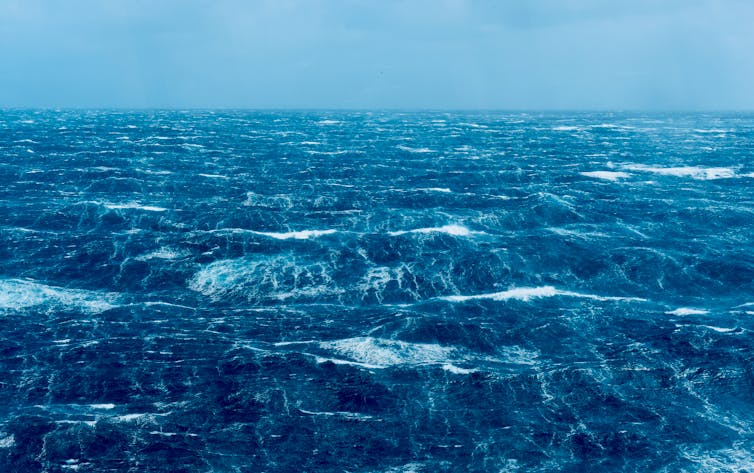Nearly 50 public water systems across Texas have reported exceeding the U.S. Environmental Protection Agency’s first-ever limits on toxic chemicals in drinking water known as PFAS.
The EPA released the new standards earlier this month, aimed at reducing five individual “forever chemicals.” These chemicals are used to make nonstick cookware, stain and water repellent clothing and firefighting foam. They have also been linked to certain types of cancer, birth defects, damage to the liver and immune system. Public water systems will need to regularly monitor, detect and remove PFAS from drinking water, according to the EPA’s new guidelines.
Here’s what you need to know about the forever chemicals:
What are PFAS?
PFAS, or perfluoroalkyl and polyfluoroalkyl substances, belong to a family of chemicals used to make products that resist heat, oil, stains, grease, and water. They have been used in industry and consumer products worldwide since the 1940s. They’ve earned the name “forever chemicals,” because they don’t break down and can persist in water and soil indefinitely.
Some estimates list more than 12,000 types of individual PFAS. The EPA says this makes it challenging to study and assess the potential human health and environmental risks.
Where have PFAS been detected?
Tests have found PFAS in the blood of people and animals all over the world, according to the EPA. The agency said most people in the U.S. have been exposed to some PFAS by touching, drinking, eating, or breathing in materials containing the chemicals, including nonstick cookware and some cleaning products.
They have been found in public drinking water systems and private drinking water wells, at landfills, disposal sites, and hazardous waste sites. They are also found in fish caught from water contaminated by PFAS and dairy products from livestock exposed to PFAS.
How do I know if my water is contaminated with PFAS?
According to a 2023 study by the U.S. Geological Survey, at least 45% of the nation's tap water is estimated to have one or more types of PFAS.
If you get your water from a public drinking water system, reach out to your local water utility and ask them to test the water for PFAS, said Treavor H. Boyer, a professor of engineering at Arizona State University.
More than 400 public water systems have tested for PFAS and more than 100 have found some level of PFAS in their water, including nearly 50 that found levels above the EPA’s new limits. Many public water systems have not been tested yet. Under the new EPA standards, they will be required to complete their initial testing for these chemicals within three years and share the results with the public.
If your local water system has tested for PFAS, ask for the results and how they may be addressing PFAS in drinking water.
How do PFAS get in drinking water?
Boyer, who researches technologies to remove these chemicals from water, said a major source of PFAS contamination is fire training and response because PFAS is found in firefighting foam.
“Unfortunately there wasn't any thought before that [PFAS] would run off the pavement, and work through the soil, and eventually go to groundwater,” Boyer said. “There's probably locations where it runs into lakes and rivers too.”
He said another big major source of PFAS contamination are chemical manufacturers discharging it into water sources and products that contain PFAS — such as nonstick cookware and stain-resistant carpeting — ending up in landfills.
What are the health risks of PFAS?
According to the EPA and the Agency for Toxic Substances and Disease Registry, exposure to certain levels of PFAS may lead to decreased fertility or increased high blood pressure when pregnant. It can also lead to developmental effects such as low birth weight, accelerated puberty or behavioral changes. PFAS has also been linked to increased cholesterol and obesity and to certain types of cancers, including prostate, kidney, and testicular cancers.
Research is still ongoing by scientists at EPA, ATSDR and around the world to better understand the potential health effects of PFAS exposure over long periods of time. EPA is also studying the health effects associated with low levels of exposure over long periods of time in children.
How do I reduce exposure to PFAS?
Boyer said the first step is educating yourself on which products are made with PFAS. His tips also include avoiding non-stick cookware. Most non-stick products contain PFAS. Try stainless steel or a cast iron instead.
“Any type of nonstick or stain repellent type product, a consumer should scrutinize it,” Boyer said.
The Green Science Policy Institute and the Social Science Environmental Health Research Institute at Northeastern University recommends buying PFAS-free products. They have a list of PFAS-free products that includes apparel, shoes, cosmetics, baby products and others.
How can PFAS be removed from drinking water?
If you’re concerned about PFAS in your drinking water, consider installing in-home water treatment filters where the main water line enters the home.
EPA researchers are studying the effectiveness of household water filters, but has identified three technologies to remove certain PFAS from at home drinking water:
- Activated carbon absorption: using carbon to attract and trap the PFAS for removal
- Reverse osmosis: purifying water by using pressure to force water through an extremely thin barrier that separates chemicals from the water
- Ion exchange: tiny beads that act like powerful magnets to attract and hold the contaminated materials from passing through the water system
You can also try water pitchers with filters. The nonprofit Environmental Working Group published a study last year that identified four water pitcher filters that can remove certain PFAS by nearly 100%. That list includes: Travel Berkey, Zero Water, Clearly Filtered and Epic Water Filter. The price of the water filters range from $20 to $330 and EWG has a guide on the pros and cons of each in-home water filtration system.
Be aware when looking for home filters. A filter may list claims for PFAS reduction on its outer packaging, but may not actually work. The EPA has tips for checking the certification of water filtration systems.
“The best advice is to make sure you pull a filter out of these certified lists, because then you know it has undergone a degree testing,” said Jennifer Guelf, an assistant professor at Texas Tech University who has researched PFAS remediation in drinking water systems for 15 years.
“PFAS is a huge class of contaminants. We can not say with a degree of certainty that these water filters remove all PFA, but they are precautionary and people’s best bet.”
Disclosure: Texas Tech University has been a financial supporter of The Texas Tribune, a nonprofit, nonpartisan news organization that is funded in part by donations from members, foundations and corporate sponsors. Financial supporters play no role in the Tribune's journalism. Find a complete list of them here.










